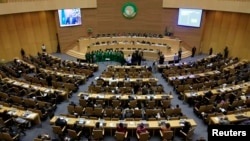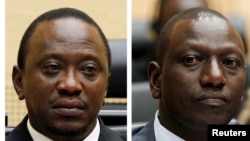ADDIS ABABA —
African heads of state meeting at Monday's African Union summit approved a proposal requesting that International Criminal Court cases against Kenyan President Uhuru Kenyatta and his deputy William Ruto be tried in the East African nation's own courts.
Kenyatta and Ruto are facing separate charges of orchestrating inter-ethnic violence across the country in the wake of 2007 elections. More than 1,100 people were killed.
The request, first submitted by African foreign ministers ahead of the summit, has been approved by the AU executive council.
Addressing media, AU chairperson and Ethiopian Prime Minister Hailemariam Desalegn said the ICC process, which was meant to punish leaders for atrocities and ill governance, unfairly targets Africans.
"Rather than an objective of taking care of those crimes as well as impunities,” he said, "now the process has degenerated into some kind of race hunting."
AU Commission chairwoman Nkosazana Dlamini-Zuma said the ICC should be a court of “last resort” and that Kenya’s newly reformed judiciary is capable of trying the case.
Nairobi-based human rights lawyer Harun Ndubi disagrees that Kenya is ready to handle the trials, and says not enough attention has been paid to the victims of the violence.
"The African Union has not said anything in sympathy or empathy with the victims, except to say they want the cases to come back to Kenya when there is no existing mechanism for dealing with the post-election violence against the suspects," he said.
Emergency intervention force
The AU assembly also agreed to establish an emergency intervention force to quell conflicts across the continent.
AU Peace and Security Commissioner Ramtane Lamamra said the new force is meant as an “interim measure” until the long-planned African Standby Force is fully operational.
"Crises, unconstitutional changes of governments, massive violations of human rights are likely to happen here and there," he said. "So, from a responsible point of view, we cannot wait until we get a perfect tool to be used.”
The commissioner said Ethiopia, South Africa and Uganda have already pledged troops to the new force.
The AU assembly also considered a report on regional crises, including the conflict in the eastern Democratic Republic of Congo between the M23 rebel movement and government forces.
Members of the Great Lakes region met on the sidelines of the summit to discuss the implementation of an agreement signed in February aimed at ending the violence.
In his closing remarks, Hailemariam said "unconstitutional changes of government continues to be a challenge," noting specifically crises in Central African Republic, Guinea-Bissau and Niger.
"While noting the importance of looking for political solutions to these problems, I have no doubt that the non-acceptance of unconstitutional changes of governance will remain our firm position," he said.
The AU summit follows a weekend of events celebrating the 50th anniversary of the organization that would become the modern AU.
The body is now considering a development agenda for the next 50 years, a plan known as Vision 2063.
Kenyatta and Ruto are facing separate charges of orchestrating inter-ethnic violence across the country in the wake of 2007 elections. More than 1,100 people were killed.
The request, first submitted by African foreign ministers ahead of the summit, has been approved by the AU executive council.
Addressing media, AU chairperson and Ethiopian Prime Minister Hailemariam Desalegn said the ICC process, which was meant to punish leaders for atrocities and ill governance, unfairly targets Africans.
"Rather than an objective of taking care of those crimes as well as impunities,” he said, "now the process has degenerated into some kind of race hunting."
AU Commission chairwoman Nkosazana Dlamini-Zuma said the ICC should be a court of “last resort” and that Kenya’s newly reformed judiciary is capable of trying the case.
Nairobi-based human rights lawyer Harun Ndubi disagrees that Kenya is ready to handle the trials, and says not enough attention has been paid to the victims of the violence.
"The African Union has not said anything in sympathy or empathy with the victims, except to say they want the cases to come back to Kenya when there is no existing mechanism for dealing with the post-election violence against the suspects," he said.
Emergency intervention force
The AU assembly also agreed to establish an emergency intervention force to quell conflicts across the continent.
AU Peace and Security Commissioner Ramtane Lamamra said the new force is meant as an “interim measure” until the long-planned African Standby Force is fully operational.
"Crises, unconstitutional changes of governments, massive violations of human rights are likely to happen here and there," he said. "So, from a responsible point of view, we cannot wait until we get a perfect tool to be used.”
The commissioner said Ethiopia, South Africa and Uganda have already pledged troops to the new force.
The AU assembly also considered a report on regional crises, including the conflict in the eastern Democratic Republic of Congo between the M23 rebel movement and government forces.
Members of the Great Lakes region met on the sidelines of the summit to discuss the implementation of an agreement signed in February aimed at ending the violence.
In his closing remarks, Hailemariam said "unconstitutional changes of government continues to be a challenge," noting specifically crises in Central African Republic, Guinea-Bissau and Niger.
"While noting the importance of looking for political solutions to these problems, I have no doubt that the non-acceptance of unconstitutional changes of governance will remain our firm position," he said.
The AU summit follows a weekend of events celebrating the 50th anniversary of the organization that would become the modern AU.
The body is now considering a development agenda for the next 50 years, a plan known as Vision 2063.





